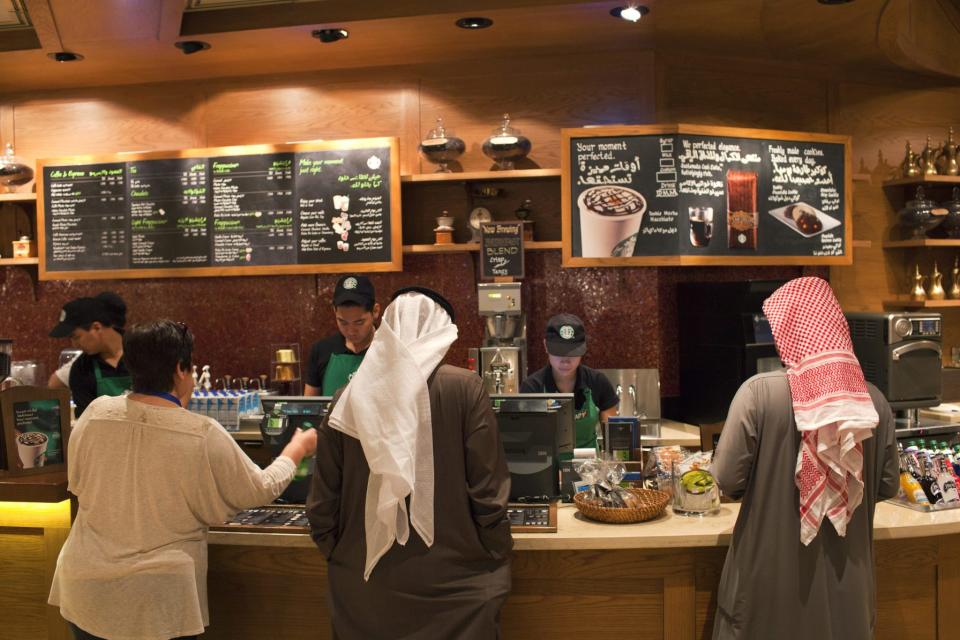Starbucks franchise lays off 2,000 employees in the Middle East due to “challenging conditions” from consumer boycotts

Alshaya Group, a franchise operator that owns the rights to operate licensed Starbucks stores in the Middle East and North African regions, announced it will lay off over 2,000 people as the business continues to suffer from consumer boycotts linked to the war in Gaza.
The consumer boycotts have created “challenging trading conditions,” Alshaya said in a statement to Reuters, and the decision to reduce the number of employees in the region was “very difficult.”
The job cuts began on Sunday, the outlet reported, and amounted to about 4% of Alshaya’s total workforce of 50,000. Starbucks became a target for consumer boycotts protesting the war in Gaza, which has killed more than 30,000 Palestinians, after suing its union group for trademark infringement, after the union made a social post in October stating, “Solidarity with Palestine.” The layoffs mean that Starbucks’ growth prospects in the Middle East are slightly more bleak while the company continues facing consumer pressure among its U.S customers.
The boycotts are meant to protest the war in Gaza, ignited by the October 7 Hamas terrorist attack that killed 1,200 people and took hundreds of hostages. Israel’s response has been called an unprecedented humanitarian catastrophe with a rising human cost: At least 17 children have starved to death and about 134 hostages remain in Gaza. President Joe Biden, widely criticized for supporting Israel, has lately called Israel’s response “over the top,” which he followed by calling for a temporary cease-fire. Biden recently announced plans to build a temporary port on Gaza’s coast to allow more humanitarian aid— which Israel has repeatedly obstructed, according to a report by Refugees International—to enter the strip.
The layoffs mean Starbucks’ growth prospects are “dimmer in the Middle East,” according to Diogenes Mejia, the director of S&P Global Ratings. It puts the coffee chain’s growth potential more in line with other fast-food giants, like McDonald’s and Yum Brands, that have become boycott targets, too.
But “what makes the impact to Starbucks unique” from other brands, he said, is that it has seen “some weakness in traffic among certain demographics in the United States,” one of the company’s most profitable markets.
“To the extent that there’s contention and people boycotting in the U.S.,” Mejia said, it will have “a bigger impact on the company than if the same thing were to happen in the Middle East.”
Starbucks cited consumer boycotts as one reason for its slower than anticipated first-quarter sales, and also forecasted slower growth for the rest of the year. On an earnings call in January, Starbucks CEO Laxman Narasimhan said the company saw “negative impact to our business in the Middle East” and that “events in the Middle East also had an impact in the U.S., driven by misperceptions about our position.” Rachel Ruggeri, Starbucks’ executive vice president, added she expects the conflicts will contribute to lower earnings in the second quarter of the year.
Because of the massive scale of the company, Mejia said, its international sales were still able to grow 7% in the first quarter. But the layoffs mean “whatever growth plans they had in the Middle East now become more complicated,” because “as a franchisee in that space, you always want to grow the number of stores you have. If you’re closing stores, that means your growth prospects are dimmer than maybe they were a year ago.”
Most of the company’s stores in the Middle East are licensed and-owned by Alshaya, which has owned the rights to operate the coffee shops since 1999. The group now runs over 1,900 stores in 11 Middle Eastern and North American markets and employs over 19,000 “green apron partners,” or Starbucks workers. The company’s 2,000 fired employees make up just a fraction of its entire workforce. Starbucks employs over 381,000 employees in 19,592 company-owned stores, and employs even more in its 18,446 licensed stores in the world. The U.S and China are two of Starbucks most promising markets for growth, where it operates 15,328 and 4,700 stores, respectively.
A Starbucks spokesperson said that the company’s “thoughts are with the green apron partners who will be leaving,” and that it will continue working closely with Alshaya “to drive long-term growth in this important region.”
McDonald’s, which became a boycott target after photos of a McDonald’s franchise in Israel donating thousands of free meals to soldiers went viral in October, reported a rare sales miss in its -fourth quarter earnings report in February, It cited declining sales in Muslim-majority markets like Indonesia and Malaysia.
Yum Brands, the parent company of fast-food brands Taco Bell and KFC, came under fire for its investment in Israeli startups, like TicTuk, an Israeli company that allows customers to order food on social networks and message apps. On an earnings call, Yum Brands CEO David Gibbs said “top line sales were impacted by the conflict in the Middle East region.”
This story was originally featured on Fortune.com
